POLITICS AND THE 2008 OLYMPICS
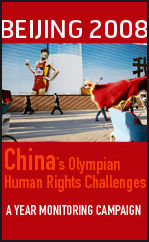 Beijing made an effort to keep politics out of the Olympics the best it could and tried to sort out human rights and dissident issues as much in advance as possible so malcontents wouldn’t embarrass the Chinese regime at the time of the Olympics themselves. Beijing arguably employed more carrot than stick methods as the Olympics nears. Foreign journalists were promised they could roam where they have wanted although many said these promises were not kept (See Media) and foreign protestors were deported rather than imprisoned.
Beijing made an effort to keep politics out of the Olympics the best it could and tried to sort out human rights and dissident issues as much in advance as possible so malcontents wouldn’t embarrass the Chinese regime at the time of the Olympics themselves. Beijing arguably employed more carrot than stick methods as the Olympics nears. Foreign journalists were promised they could roam where they have wanted although many said these promises were not kept (See Media) and foreign protestors were deported rather than imprisoned.
When Beijing won the bid to host the Olympics there were those who thought the Olympics could help reform China, with some even arguing that the Olympics might help bring democracy to China as it did in South Korea in 1988 and make it a fairer place governed by the rule of law rather than whims of party officials. The bid committee stated, “By allowing Beijing to host the Games you will help the development of human rights.” Others think the Olympics will only give a mark of legitimacy to the regime.
Beijing clearly used the Olympics to further its political aims. Joseph Cheng, a professor at the City University in Hong Kong told the Los Angeles Times. “The Olympics is certainly a good diversion from China’s problems. They’re also seen as a way to promote nationalism and legitimize the regime.” Zhou Xiaozheng, a sociologist at the People’s University in Beijing, told the Los Angeles Times, “It’s a legitimate question whether China should spend those huge sums on the Olympics when 900 million farmers are still very poor...But after emerging from a century of revolutions, wars, and political movements, the government sees this as a landmark opportunity for recognition from the outside world." Bao Tong, the most senior official imprisoned for opposing the Tiananmen Square crackdown, wrote: “The government has been quite as eager to use the Games as a ploy to enhance its international prestige. The Chinese government fervently hopes through its coming-out party to boost its domestic support and regain people’s trust.”
The international community is putting a lot of pressure on Beijing to uphold promises it made to get the Olympics — namely to improve human rights and promote openness.China expert Orville Shell said, “I don’t think there has been a more important interaction with the outside world than the Olympic Games. They view this as their coming-out party, christening, bar mitzvah — you name it. And the leadership understands that the Chinese people, too, even those who don’t like Marxism-Leninism, desperately yearn to have their country be great and respected.”
China’s government is not the only government that has used the Olympics to further its political aims. The Nazis did in most famously in Berlin in 1936. David Wolf, a public relations official who stood near U.S. President Ronald Reagan at the opening ceremony for the 1984 Olympics in Los Angeles, told the Los Angeles Times. “I can tell you every country exploits the feel-good aspects and often well before opening day.” The Olympics themselves are the objects of politics: the boycotts of Moscow in 1980 and Los Angeles in 1984; the Munich massacre in 1976; the African nation boycott to protest apartheid in South Africa in 1972; and the raised fists by black American athletes at Mexico City in 1968. The Olympics in Seoul provided a beacon for international attention and a rallying point that helped bring down an oppressive regime and install democracy.
World Leaders and the 2008 Olympics
A record 80 heads-of-state attended the Opening Ceremonies, Closing Ceremonies or events at the Beijing Olympics. The previous record was 31 in Sydney. A special thank-you party so to speak for former U.S. President George Bush and former Secretary of State Henry Kissinger was hosted ta the Forbidden City
On the day of the Opening Ceremonies Chinese President Hu Jintao hosted a luncheon attended by U.S. President George, Bush, Russian Prime Minister Vladimir Putin, Japanese Prime Minister Yasuo Fukuda and most surprisingly French President Nicolas Sarkozy, who only a few months earlier had suggested that world leader boycott the Opening Ceremonies to protest Chinese policy in Tibet. In a speech at the luncheon Hu said, “the world has never needed mutual understanding, mutual toleration and mutual cooperation as much as it does today.” Before the Olympics China reached out to Asian neighbors, particularly Japan and Taiwan, to improve ties.
U.S. President George Bush hung around for a couple days after the Opening Ceremonies. He attended the United States-China basketball game, hit a volleyball around with eventual beach volleyball gold medalist Misty May-Treanor, took a ride on the Olympic mountain bike course, and attended a practice of the women’s softball team.
Human Rights and the 2008 Olympics
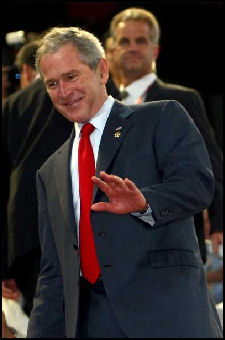
Bush at the Opening Ceremonies When asked about the Olympics, Tibet, Darfur and human rights, Chinese President Hu Jintao told foreign reporters, “I don’t think that politicizing the Olympic Games will do anything good to addressing of those issues. And I think such an attempt runs counter to the spirit of the Olympics Games and goes against shared aspirations of people from around the world.” The IOC was criticized for not raising more objections to things like the blocking of Internet sites and intimidating journalists and protesters.
According to the Geneva-based Centre for Housing Rights and Evictions, 1.5 million people were forcibly evicted to make way for Olympic venues and infrastructure. The Beijing government figure was 14,901. Authorities took away 300 Bibles from four Americans who had plans to distribute them. China provided free Bibles to athletes, tourists and spectators to anybody that wanted one during the games. About 10,000 bilingual copies were distributed at the Olympic Village. Most of the others were given out at official state churches.
Beijing promised to improve human rights in China during its lobbying efforts to win the Olympics in 2008. On the eve of the 2001 vote to determine who gets the 2008 Olympics, Liu Qi, the mayor of Beijing and head of the team bidding for the 2008 Olympics, said the Olympics in Beijing would “benefit from the furtherance and development of our human rights cause” and would be “an opportunity to foster democracy, improve human rights, and integrate China with the rest of the world.” Tiananmen Square organizer Wang Dan and other dissidents were released one month before the International Olympic Committee came to Beijing for its inspection tour.
Whether and how much human rights had improved In China as the Olympics neared was a matter of debate. Dissidents were still rounded up and harassed; the media was still censored; people could still get in big trouble for expressing their political views; and the government still exerted a lot of heavy-handed control on people’s lives. In April 2008, Amnesty International issued a statement that said that China’s human rights abuses were getting worse because of, not despite, the upcoming Olympics in Beijing. If anything the government is cracking down on dissenters harder than ever. A total of 742 people were arrested in 2007 for political crimes like subversion, according the San Francisco-based Dui Hua Foundation. This was the highest number in eight years and more than double the number than in 2005. See Human Rights, Government
In preparation for the 2008 Beijing Olympics there were reports of homeless people, petitioners and beggars being rounded up in Beijing and sent back to their villages or hometowns or in some case to re-education camps and even mental hospitals. According to human rights and labor groups authorised Olympic merchandise had been made with child labor as young 12 and workers paid less than minimum wage.
Many feel that China reneged on the promises it made to the International Olympic Committee (IOC) to improve human rights. Some feel that the IOC should have taken some kind of action because China did break its promise or at least put more pressure on China to improve human rights. IOC head Jacques Rogge said that China made a moral commitment to improve human rights but made no contractual agreement on the issue.
China says that it fulfilled its obligation and improved human rights, pointing to new laws that protect the elderly, women, employees and migrant workers. An article in the People’s Daily read: “Those who want to use the Olympics to discredit China and those who think the Olympics will promote China to change in the way they “hope,” are doomed to be disappointed. There efforts will be futile.”
Protests During the 2008 Olympics in Beijing
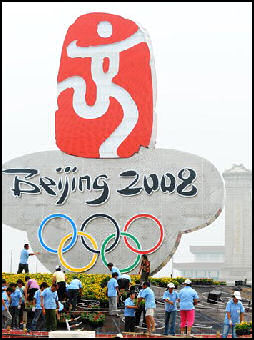
Tiananmen Square duirng the Olympics There were few protests during the Olympics because potential foreign protesters were denied visas and Chinese protesters were not granted permission to protest. The protests that did take place were very small, involving only a handful of people, and were mostly carried out by foreigners.
In a rare meeting with foreign reporters a few days before the start of the Olympics, Chinese President Hu Jintao warned against “politicizing” the Games. “Politicizing the Olympics goes against the Olympic spirit and the shared aspirations of people all over the world,” he said in the carefully scripted press conference.
Three “protest zones” were set up in public parks several kilometers from the sports venues. Applicants had to fill out a lengthy application and questionnaire. One zone had mock-ups of the White House and other world monuments to create the illusion the protesters were somewhere other than China. Citizens were surprised the government would provide them with a forum to air their grievances.
Police did not approve any applications for protests during the Olympics. Chinese authorities said they received 77 applications for people who wanted to hold protests, involving 149 people, including three people from overseas. In a typical case an individual filed paperwork for the protests, appeared for an interview and was told to come back in five days but was picked up by police several hours after the interview and sentenced to a month in prison for “distributing social order.” In the end many saw the “protest zone” scheme as means of getting malcontents to declare their intentions against the government and use their declarations to crack down on them.
One man, who didn’t apply for permission, managed to stage a small protest with his three-year-old son, with the son holding up a sign saying his grandmother was not fairly compensated for being kicked off her land. Some foreign photographers managed to take some picture of the boy before the man fled in a taxi 10 minutes after the protests began. Police tried to stop the man but had to back off because of the presence of the foreign press. Later the grandmother was harassed by authorities.
The largest civil disturbances in Beijing associated with the Olympics took place several weeks before the Games began when large numbers of “petitioners” airing their complaints on land grabs, corruption , police torture and various grievances — began gathering around petition reception offices in Beijing. Hundreds were rounded up outside the offices and bus and train stations where they entered the capital. Tighter checks were issued on travelers entering Beijing to catch them. There was also a small demonstrations in Qiamen near Tiananmen Square by people protesting being forced from the homes and not being adequately compensated.
Foreign Protestors and the 2008 Olympics
Many foreign NGO staffers based in Beijing were asked to leave for the summer. Tightened visa requirements — which in some cases required visitors to supply letters of invitation, hotel reservations, round-trip tickets and bank statements — prevented or deterred perceived foreign troublemaker from entering the country. Rules were established that prohibited six types of foreigners from entering Beijing during the Olympics. These including: 4) the insane and those suffering from mental disorders and 6) those who “might engage in any acts that threaten the security or interests of China.”
Even so Reporters Without Borders managed to hijack an FM radio and broadcast speeches by human rights advocates and appeals for freedom of expression for 20 minutes. There were few protests and political gestures by athletes. One exception was a Polish weightlifter who shaved his head before awarded a silver medal to show solidarity with Tibetan monks.
Fourteen would-be protesters from Hong Kong were detained for two days in a hotel and then sent back to Hong Kong by plane for planning to protest being swindled out of just compensation for investments.
Fifty-eight foreign protestors were arrested and deported. Among them were American Christian protesters who staged a small anti-abortion protest and prayer vigil in Tiananmen Square. After an arguments over who would pay for the airplane ticket for the deportment they were threatened with jail then fed Kentucky Fried Chicken and taken to the airport and deported.
Protests Before the 2008 Olympics
In August 2007, around the time of the one year countdown to the start of the Olympics, there were a several small protests by both foreigners and Chinese. Amnesty International and the Committee to Protect Journalist issued reports, saying China has failed to fulfill its promises to improve human rights and uphold press freedoms. Since then protests have gotten bigger, louder and drawn more publicity.
There were a number or protests associated with the 2008 Olympics in Beijing. They fell into three main groups: 1) those that objected to China’s human rights policies; 2) those that supported Tibet; and 3) those opposed to China’s support of Sudan and its policies in Darfur.
Explaining why the Olympics had become a focal point for international protests on a number of China-related issues and causes Jill Saviit of Dream of Darfur told the New York Times magazine, “The Olympics is a unique lever with the Chinese, and we’re not going to get another one — it ain’t happening again.” In response to the point that protests only seem to put Beijing on the defensive, one activist told the Los Angeles Times, “trying to talk to them politely has not born much fruit.”
The argument that China used to thwart protests — whether they be for Tibet or Darfur — was that the Olympics should not be politicized and any attempt to do so violates the Olympic spirit. The Chinese public seemed to be more sympathetic to the Chinese government than international critics.
But the Chinese government can not say with a straight face that it wasn’t politicizing the Olympics itself. The whole event was an effort by the Chinese Communist Party to boost its stature abroad and legitimize its rule at home. The Beijing Olympic Committee said in its website that it was committed to “promoting mass sporting events on an extensive scale...and spurring the socialist modernization of China.”
There was some discussion that athletes might stage protests at the Olympics. The IOC strongly opposed this, citing Article 51.3 of the Olympic Charter, which forbids “any kind of demonstration of political, religious or racial propaganda” at “Olympics sites, venues or other areas.”
Darfur and the 2008 Olympics
In February 2008, filmmaker Steven Spielberg said he was withdrawing from his position as creative advisor for the opening and closing ceremonies because of China was not using its influence to help improve the situation Darfur. Spielberg said, “I find that my conscience will not allow me to continue with business as usual...The situation has never been more precarious — and while China’s representatives have conveyed to me that they are working to end the terrible tragedy in Darfur, the grim realties of the suffering continue unabated.”
The Chinese government expressed “regret” over Spielberg’s decision and said that efforts to link China to Darfur are “irresponsible and unfair.” The Chinese media condemned him and Western celebrities for politicizing the Olympics. The Guangming Daily said Spielberg “broke his promise” and “betrayed the Olympic spirit." According tot the People’s Daily. “A certain Western director was very naive and made an unreasonable move toward the issue of the Beijing Olympics.”
The actress Mia Farrow was at forefront of the effort to use the Olympics to bring attention to China’s role in Sudan and Darfur. Farrow used the term “Genocide Olympics” to describe China’s role in Darfur in an op-ed piece written in the Wall Street Journal with her son Rinan Farrow. She put a lot of pressure on Spielberg and led an alternative Genocide Olympics torch relay of sites associated with genocide in Chad and Darfur, Rwanda and Cambodia aimed at showing Beijing that it may have hosted the Olympics but its connections with atrocities committed outside of China had not gone unnoticed. From Farrow’s camp there was talk of a boycott
Around the same time that Spielberg made his announcement a letter signed by eight Nobel Prize winners, 119 U.S. lawmakers and several entertainers was presented to the Chinese that called on them to use their “significant influence” in Sudan to stop the genocide in Darfur. Mia Farrow organized the letter and wanted to give it personally to a Chinese official but was rebuffed and forced to slip the letter under the door of the Chinese consulate in New York.
Farrow is very active in group called Dream of Darfur, headed by Jill Savitt, that has had a degree of success pressuring China on the Darfur issue and has developed tactics employed by a number of anti-Beijing groups. A large scale Beijing Olympics campaign on the Darfur issue was first proposed by Eric Reeves, a professor at Smith College, at a meeting of Save Darfur. Activists have also lobbied corporate sponsors of the Olympics and mutual funds that invest in Chinese stocks.
Beijing officials have said any attempt to pressure them or disrupt the Olympics on the Darfur issue would fail. An article in the People’s Daily read, “Western exploitation of the Olympics to pressure China immediately provoked much disgust among ordinary Chinese. The vast majority of Chinese people have expressed bafflement and outrage at the Western pressure. In their view its absolutely absurd to place the Darfur issue, so many thousands of miles away, on the head of China.”
Even so China has seemed a little rattled by the bad publicity surrounding its involvement in Sudan. It announced it would send a group of peacekeepers to the United Nations mission in Darfur and expressed “grave concerns” to the Sudanese government about the violence in Darfur. See Sudan, International, Government
Tibet and the 2008 Olympics
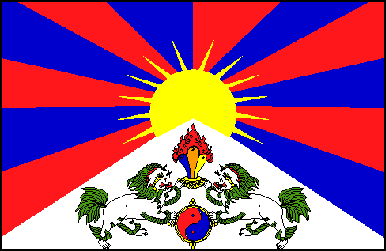
Tibetan flag
Around the time of the one year countdown to the start of the Olympics, large anti-Chinese, pro-Tibet protests were staged in New Delhi; banners protesting the Chinese presence in Tibet were hung on the Great Wall of China; and a pro-Tibetan activist shouted questions at Rogge when he visited Beijing. The foreign protesters who hung the banner and the activist who harassed Rogge were deported on a plane to Hong Kong.
In April 2007, Chinese authorities arrested four pro-Tibetan protesters who had climbed to Mt. Everest base camp and hung a banner to protest the Olympic torch through Tibet. A soccer match between players from India and Tibet was staged in Delhi to protest the Beijing Olympics.
More than 100 current and former Olympics athletes, including and number of world record holders and gold-medal favorites in track and field such as American hurdler Lolo Jones and Cuban hurdler Dayron Robles, published an open letter to Chinese President Hu Jintao urging him to seek peace in Tibet and safeguard human rights in China. Athletes were urged to make a two-handed T for Tibet but none were seen in the Games, in part because the IOC banned it.
On the issue of human rights awareness, IOC President Jacques Rogge said “Tibet, rightfully so, is on the front pages. But it would not be on the front page if the Games were not being organized in China.”
Students for a Free Tibet staged eight small protests involving 55 people in Beijing during the Olympics, including a protest outside an ethnic minority theme park. Most of their activities involved unfurled “Free Tibet” banners and displaying the Tibetan flags, acts which are illegal in China. Most Free Tibet protesters came with tourist visas, posing as typical Olympic tourists, but a close look in their luggage would have turned up things like walkie talkies, climbing ropes, numerous black Sharpie marker and 25-by-10-feet nylon sheets.
At dawn two days before the Olympics officially began members of the group climbed 20 meters up a pole on a bridge near the Bird’s Nest stadium and hung a banner that said, “One World, One Dream, Free Tibet.” The banner hung for about an hour. Group members — three Britons and an American — were taken away by police about 12 minutes after the banner was hung.
Later, four people — three men from Germany and the United States and a British woman — were held after unfurling a Tibetan flag outside the Bird Nest stadium just after midnight. About midway through the Olympics, three Americans, a Briton and a Canadian were detained and deported after they unfurled Tibetan flags and a banner with “Free Tibet” spelled in lights in English and Chinese from an Olympics billboard near China Central TV headquarters in Beijing.
Eight Americans, a Briton and a German of Tibetan descent were arrested and sentenced to 10 days of detention after police broke up their unauthorized pro Tibet demonstration. It was a rare penalty give to foreigners for “upsetting public order.” The protesters were released early and deported due to diplomatic pressure.
Nationalism and the 2008 Olympics
The Tibetan issue and the Olympic torch relay have generated strong nationalist and anti-Western sentiments. Shi Yinhong of the People’s University of Beijing told Reuters, “The Western response to Tibet has ignited this sense that although we’ve become richer, they still treat us like it’s the 19th century...If the purpose of the West in initially supporting the 2008 Olympics was to promote a more open, pro-Western China, they have failed.”
One Chinese newspaper said in January 2008 that China would never compromise its core interests, condemned critics and portrayed itself as a victim facing “accusations from all over the world, including misunderstandings, sarcasm and very harsh criticism.”
Some Chinese saw the disruption of the torch relay as a deliberate attempt to blacken China’s name and ruin the Olympics.
The Communist government in the beginning tacitly condoned expressions of anti-Tibetan sentiments, manifested most strongly by cybernationalists in the Internet and with the boycott of Carrefour. The behavior of young Chinese reminded some of the Red Guards during the Cultural revolution. In the end government, worried about its image abroad, reigned in the students with a call for “rational patriotism” and “Olympic harmony.”
When Jin Jing, the “wheelchair angel”, questioned the boycott of Carrefour, she was attacked as a “traitor” and for being “unpatriotic.”
Green Olympics and Dealing with Beijing's Air Pollution
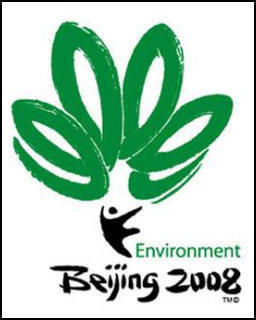 Beijing promised to host a green Olympics. Showers in the Olympics Village were heated by geothermal energy. The triathlon course was designed to protect the habitat of the rare giant salamander. More than 28 million trees were planted — - some of them acting as buffers against Gobi desert sandstorms.
Beijing promised to host a green Olympics. Showers in the Olympics Village were heated by geothermal energy. The triathlon course was designed to protect the habitat of the rare giant salamander. More than 28 million trees were planted — - some of them acting as buffers against Gobi desert sandstorms.
Beijing said it spent $16.4 billion on environmental projects for the 2008 Olympics, including wastewater treatment plants, solar-powered street lamps, and water-saving nonflush toilets, with much of the money earmarked for moving heavy polluters out of the city. Beijing recycled a third of all waste materials, tripled the natural gas supply and generated electricity with Beijing’s first wind power station. The number of trash cans in Beijing was increased by around 10,000 to 25,000.
One of the biggest problems that Olympic organizers had to deal with is Beijing’s air pollution, which increases in the summer when humidity and a lack of wind traps particles and pollutants in the air. International Olympic Committee President Rogge said that athletic performances might be “slightly reduced” because of the pollution and some events might have to be postponed or rescheduled if pollution levels were particularly high on a certain day. Coaches and athletes were quite upset by this statement because changing the time of an event at the last minute can cause trouble for an athlete orienting his training towards a particular day and time. Later Rogge said that air pollution situation in Beijing was “perfectly manageable."
In some surveys, Beijing is ranked as the second most polluted city in the world. It's air quality is 16 times worse than New York City, and the amount of suspended particles is ten times higher than Los Angeles. Air pollution is measured on a scale of 0 to 500 with 200 being bad and 300 being harmful to health. Each year there are numerous days above 300 and occasionally there is a reading over 500, which is like having the mercury in a thermometer break through the top of a tube.
According to one study breathing the air in Beijing is the equivalent to smoking three packs of unfiltered cigarettes a day. The air is so bad people sometimes go weeks without seeing the sun and sometimes even have trouble making out buildings a few blocks away. Newspapers run reports on the best times to go outside: usually before morning rush hour, in the middle of the day and before the evening rush hour and before the time when people cook their meals with coal stoves.
Athletes and Air Pollution at the 2008 Olympics
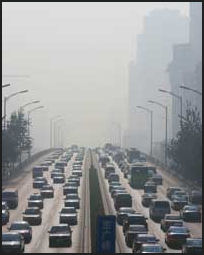
In March 2008, International Olympic Committee IOC issued a statement saying that the smog in Beijing could pose a health risk to endurance athletes such as those who participate in the marathon, triathlon, distance walking and swimming, mountain biking, and distance cycling events, Based on data collected in August 2007, the IOC said “there may be some risk” and the IOC will put in place “procedures, which will allow a “B-Plan” to be activated for such events if necessary.” Olympic events have been rescheduled before, notably ski events postponed because of bad weather.
By some estimates air pollution in Beijing reduces oxygen input by 20 percent. Athletes who have competed in Beijing have said that exerting themselves there left them with chest pains, breathing problems, and burning eyes. Some have said the Beijing air impeded their ability to compete at a high level or prevented them from competing altogether. A mountain biker who had to stop halfway through a 30-mile race to vomit before the Olympics told the Washington Post, “I struggled with it for a while. You’re breathing as hard as you can but you feel like your muscles don’t want to work, You’re filling your lungs but you are not sure what’s going in there.”
Joe Cassmassi, a meteorologist who helped forecast pollution levels at the 1984 Olympics in Los Angeles told the Washington Post, for athletes accustomed to Beijing, the pollution feels like “an invisible rag that chokes your lungs. Eventually you acclimatize yourself, but a lot of the people are going there and all of all of a sudden they’re hit with pollutants they are not used to.”
Beijing poses three risks for endurance athletes. The high heat and humidity can zap their energy; particulates, sulfur dioxide and carbon monoxide can trigger exercise-induced asthma; and certain pollutants can cause allergic reactions that cause air passage to become irritated or constricted. Particularly worrisome is ozone which can inflame a person’s windpipe and make it more difficult to breath. Treating allergies and asthma at the Olympics can be a problem because some medicines are banned substances. There are plans to conduct 4,500 drug tests, up from 3,500 in Athens.
Olympic multi-gold-medalist and marathon world record holder Haile Gebrselassie of Ethiopia said he would not compete in the marathon at the Beijing Olympics because of the pollution. He suffers from exercise-induced asthma. He said he will compete in the 10,000 meters run. The British women’s marathon world-record-holder Paula Ratcliffe, who also has asthma, did not run. Gebrselassie told Spanish new sources, “It’s going to be the hardest marathon in history....I’d love to go for it, but health is my first priority.” Stefano Baldini, the Olympic gold medalist in Athens in 2004, said, “Pollution is a problem only for the guys with breathing problems. For me it is not a problem. The real problem is heat and humidity."
Some countries have decided to house their athletes away from Beijing until right before the competitions so they are not adversely affected by air pollution. Similar strategies were also used in Greece for the Athens Olympics. Australian athletes said they would come to Beijing as late possible to avoid the air pollution. Teams from 20 countries — including Britain, Germany, Sweden and Brazil — prepared in Japan. Fifteen others — including the Netherlands, and Switzerland — based themselves in South Korea. American athletes set up shop in Dalian, a relatively clean, Chinese coastal city. Several countries requested that Beijing provide training facilities close to but not in Beijing. So many athletes may put off coming to Beijing until the last minute many might miss the Opening Ceremonies.
U.S, athletes had access to surgical masks designed for non-competition use. Scientist with the U.S. Olympic Committee experimented with different types of face masks to find one that effectively filter outs pollution particles but allows enough air to come through.
Four American track cyclists arrived at Beijing International Airport wearing their U.S.-Olympic-Committee-issued air-filtration masks. There was a big uproar, Their pictures were shown all over the world. The Chinese felt insulted. The cyclist quickly apologized and the episode was quickly forgotten.
Efforts to Combat Air Pollution at the 2008 Olympics
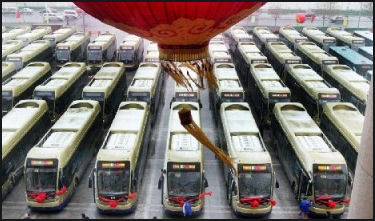
Fleet of electric buses
Chinese scientists were ordered to produce of quota of “blue sky days” in Beijing. Much of the $12.2 billion earmarked for cleaning up the city was focused on cleaning up the air. More than 200 of the foulest smokestack industries and power plants were closed or moved. An entire steelworks — Capital Iron and Steel — was moved out of Beijing, 100 miles to the east. It had been in Beijing for 50 years and used to emit nasty “red smoke all night” and once produced a toxic gas cloud that caused several people to choke to death.
Power plants were modified to reduce emissions; 16,000 coal-burning factories were renovated; 1,000 small coal mines were closed. Factories in the greater Beijing area and coal mines in nearby Shanxi Province were supposed to close down for weeks or months before the Olympics. Gas stations closed, industrial spraying and painting was banned. All construction was stopped to reduce dust levels. Officials with the Beijing Olympics Organizing committee sais their efforts payed off before the Olympics, saying that number of blue sky days has increased from 100 in 1998 to 241 in 2006.
Beijing set up a state-of-the-art control room that measured pollution at 27 monitoring stations around the city. But it was been less than forthcoming with data from these stations and of details of its pollution-fighting plans and success at reaching its goals. The stonewalling and lack of information about specific pollutants and specific areas made people suspicious. Promises to close factories outside Beijing and nearby cities were broken, apparently because some factories refusing to follow government orders to close down. The whole idea of tallying “blue sky days” as a way of measuring pollution was regarded as a joke by many scientists.
In April 2008, the Chinese government announced that Beijing would close factories and force 19 heavy polluters to reduce emissions by 30 percent two months before and during the Olympics and said if the weather conditions were particularly bad even more extreme measures would be taken. Other measures were taken in Tianjin, Hebei, Inner Mongolia, Shanxi and Shandong.
Among the 19 polluters were several plants run by Shougang Steel — the Beijing’s worst polluter — Yanshan Petrochemical group, Jinganeneg Thermal Power and three other coal-burning plants and Number 27 locomotive Factory. The Eastern Chemical Plant of Beijing and several cement factories were shut down completely as were industrial coal-boilers and gas station that don’t meet emission standards that are among the toughest in the world.
Fifty factories, including two cement makers, in Tianjin, 115 kilometers east of Beijing, and 300 factories in Tangshan, 150 kilometers east of Beijing, were ordered to close from late July to mid September. Tianjin, which hosted some Olympic soccer games, halted the construction of 26 buildings during the Games. A contingency plan was in place to close even more factories and coal-fired coal plants and impose driving restrictions in Tianjin and other cities around Beijing if pollution worsened during the Olympics.
Vehicles, Air Pollution and the 2008 Olympics
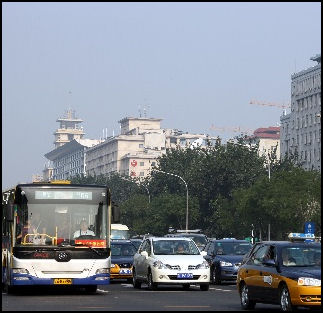
even license plates
Emission standards were tightened on vehicles in the wake of the 2008 Olympics. More than 50,000 smog-producing taxis were taken off the streets and replaced with more efficient models. More than 4,000 buses were put in operation that ran on natural gas and produced virtually no emissions.
In August 2007, Chinese authorities reduced the number of cars in Beijing by 1 million over a four day period using an odd-even licence plate system that was a test for a similar system to be used during the Olympics. Even though skies were still hazy and brown as usual and pollution levels were slightly higher than before the test, the authorities deemed the test a success, saying that pollution readings were in the 90s. Readings of 100 to 200 are regarded as slightly polluted. The Chinese media was told to play up the positive aspects of the test.
Cars with even numbered license plates were barred from driving two days. Cars with odd numbered license plates were barred from driving on two other days. Taxis, buses, police cars ambulances were exempted. Bus and subway service was increased. Traffic ran smoothly and there were few complains about lines for buses or subways.
Driving restrictions began about 2½ weeks before the Opening Ceremonies and continued for about a month after the Olympics ended. Half of Beijing’s vehicles were kept of the roads using the odd, even license plate system. Taxis, buses and emergency vehicles were exempted from the rules. Beginning in early July, about 300,000 vehicles that failed to meet strict emission standards were banned from downtown Beijing.
Pollution During the 2008 Olympics in Beijing
The first few days of the Olympics were smoggy but overall Beijing experienced its cleanest air in more than a decade during the Games. There were several genuinely blue sky days as anti-pollution measures and heavy rains cleared the air. In the month of August there were 14 “level one” days — the highest possible rating. Major pollutants were down 50 percent during the 16 days of the Olympics and down 45 percent for the month of August. Among the biggest improvements was lowering carbon monoxide levels by getting rid of the main cabon monoxide source, cars idling in heavy traffic.
Heat and humidity were more of a problem than the pollution in the cycling events and other endurance events early in the Olympics. After rain had washed out the air, pollution was not a problem when the marathons were run towards the end of the games. Some athletes actually hoped there would be more pollution, . An Australian trap shooter said, “The smog helps us. I can see the orange disks better in the sky.”
The pollution curbs were kept in place for about a month after the Olympics were over. At that time construction resumed, factories resumed production and drivers could drive their cars whenever they wanted.
Over all the air pollution index dropped from 142 in May to 90 in June and 77 in July reaching 56 in August and 57 in September. After the anti-pollution restrictions were lifted in September the pollution returned, with a 73. Things improved somewhat when a policy was enacted that banned cars once a week based on license plate number.
When there was smog the government called it “marine mist.” Some athletes said it was more like fog. Leonel Manzano, an American 1,500 meter runner said, “If it was smog I would taste it.” American hurdler Terrance Trannel who wore a mask on smoggy days back home in Atlanta wore a mask for one day in Beijing and stopped wearing it after noticing that no other athletes wore one
Weather Preparations for the 2008 Olympics in Beijing
The Chinese were obsessed with the weather before and during the 2008 Olympics in Beijing. There was an entire newspaper devoted to the topic. Athletes were equally obsessed. American distance runners wore special vests placed in a freezer to cool their bodies before the start of the race.
Four satellites were positioned to transmit weather data during the Games. Radar systems were upgraded so that storms and rainfall could be predicted for specific venues. The Beijing Weather-Engineering Office hired 32,000 people and set up 26 controls stations to create a “defensive web” around the Bird’s Nest stadium to prevent rain that might dare to fall on the Opening Ceremonies. Weather forecasters ran hourly forecasting meetings; used advance radar to monitor things like approaching typhoons, weather fronts and evening thunderstorms; and employed a super computer recently bought from IBM for “several million dollars” to help to predict the weather and pollution levels.
The IBM supercomputer was 1,000 times more powerful than any other weather forecasting system used at previous Olympics. With this technology forecasters hoped to make detailed forecasts for specific sites and sports and help athletes by giving them accurate predications of wind speeds and direction and temperatures at specific times of the day. The computer provided every venue with three-hourly forecasts and half-hourly satellite pictures. The information was distributed on text messages, TV screens, scoreboards and the Internet.
Meteorologist from seven countries — China, Japan, the United States, France, Australia, Canada and Austria — competed to see who could predict the weather most accurately. Weather forecasts were made every three hours for up to 36 hours in advance and the champion was determined based on how well the forecasts matched up with the real weather.
The weather turned out to be very cooperative, extraordinarily so. Before the Olympics the weather went according to script. June was the wettest June in 15 years and the heavy rains that fell then helped cool temperatures and clean up the air when the full scale anti-pollution measures kicked in at the end of July. Smog accumulated though despite the measures but it was washed away thank to winds and rains associated with Typhoon Fung-Wong which made landfall south of Beijing.
Rainmakers and Weather Modification at the 2008 Olympics in Beijing
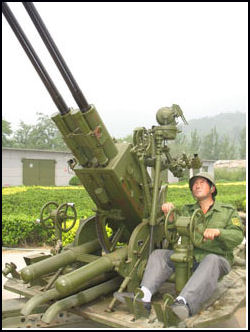
rainmaking artillery Officials at the 2008 Summer Olympics in Beijing worked out strategies to try and ensure it didn’t become foggy during the games and when it rained it cleansed out the air but doesn’t interfere with events. Rain makers fire rockets and bombard clouds with rain-producing chemicals in an effort to produce storms before events so they didn’t occur during them. Tests were conducted in July 2007 to determine which rockets worked best dispersing rain clouds and bringing sunshine. One of Beijing’s worst fears was that would rain during the opening and closing ceremonies which were held outside.
A typical rainmaking unit was comprised of eight farmers. When given the signal they rushed to a battery of 1960s-era, 37mm anti-aircraft guns in their village courtyard. Four carried shells, two loaded them and two aimed and fired. One villager told the Times of London, “the telephone rings and you must be there within a few minutes. You check the equipment, take aim and fire. The usual purpose is to prevent hail, but now it is to protect the Olympics.”
Weather During the 2008 Olympics
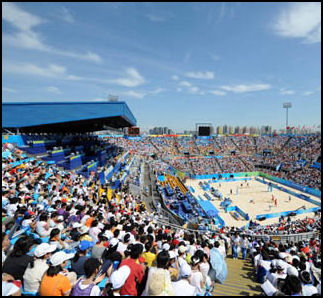
fine day the beack volleyball Heat and humidity were clearly factors in the early days of the Olympics. The men’s cycling road race was held on the first main day of competition on a 152.2-mile course in 86 degree F heat and 94 percent humidity in the milky, hazy smog that Beijingers know so well. Even with ice packs the cyclists were sweating heavily before the race even began. Of the 143 men that started the race 53 failed to finish. One racer said, “It was like riding in a sauna.” Another said, “It feels like you have hot cream all over your body. Once you go full-gas, you cannot breathe.”
But soon after that air-clearing rains arrived. The timing of the rain was good. It didn’t affect the Opening Ceremonies and it spectacular fireworks or other major events. As a preventive measure 1,104 rockets were fired over an eight hour period from 21 places to disperse clouds and make sure no rain fell on the Opening Ceremonies. Rain was cited by Opening Ceremonies director Zhang Yimou as the biggest threat to success of the event.
The rain mainly caused disruptions for minor sports. It delayed tennis matches and rowing events; made marshes out fields for team sport events; and created some unanticipated problems. The New Zealand field hockey team, for example, abandoned their white uniforms because when it rained they “get a bit see-through.” The rain was a boon for some events. It cooled the endurance races.
After the heavy rains heat and pollution were not big problems and there were a number of “blue sky days” in which the skies were truly blue, the air was clean, and the humidity manageable — all rarities in Beijing.
A study by the National Science Foundation in the United States and the National Science Foundation of China released in June 2009 reported that the wet weather played a bigger part in cleaning the air during the Olympics than the massive pollution control measures. Before the rain the air pollution was much worse in Beijing than it was at other recent Olympics with particulate matter often exceeding what is considered safe by the World Health Organization but one third less during the Olympics than during other periods.
Image Sources: 1) Human Rights Watch; 2, 3) Beijing Organizing Committee for the Games of the XXIX Olympiad; 5) Tibet Uprising.org
Text Sources: New York Times, Washington Post, Los Angeles Times, Times of London, National Geographic, The New Yorker, Time, Newsweek, Reuters, AP, Lonely Planet Guides, Compton’s Encyclopedia and various books and other publications.
Last updated April 2010
